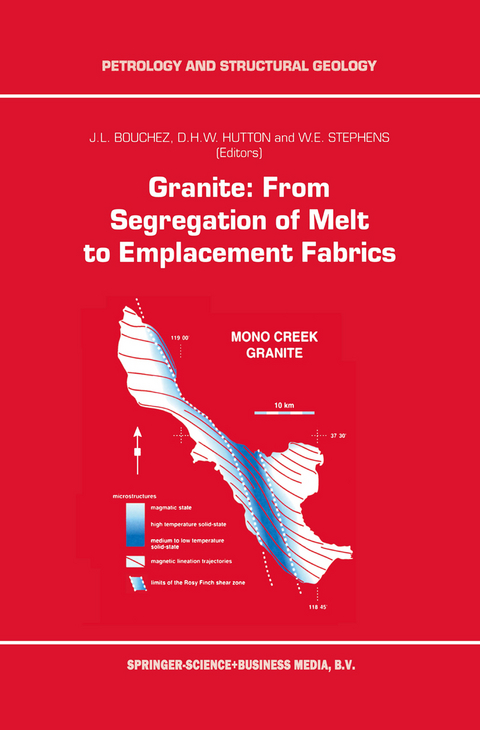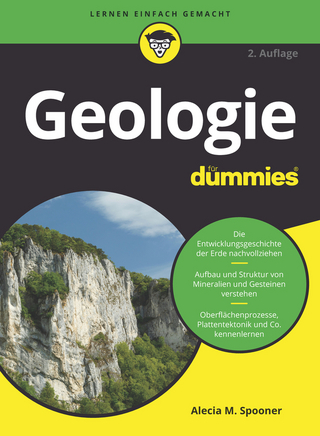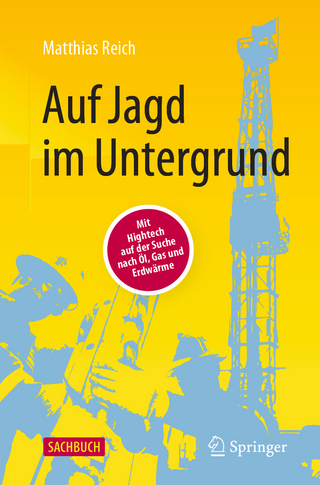
Granite: From Segregation of Melt to Emplacement Fabrics
Springer (Verlag)
978-0-7923-4460-5 (ISBN)
viii debate of those earlier days has been beautifully summarized by H. H. Read in his famous "Granite Controversy" (1957). Read's formulation of the controversy occurred at the time when geochemistry was as a new and powerful tool. The new techniques opened era during which emerging an granites were considered mainly from this new viewpoint. Geochemical signatures have shown that mantle and crustal origins for granites were both possible, but the debate on how and why granites are emplaced did not progress much. Meanwhile, structural geology was essentially geometrical and mechanistic. In the early 70's, the structural approach began to widen to include solid state physics and fluid dynamics. Detailed structural maps of granitic bodies were again published, mainly in France, and analysed in terms of magmatic and plastic flow. The senior editor of this volume and his students deserve much of the credit for this new development. Via microstructural and petrofabric studies, they were able to discriminate between strain in the presence of residual melt or in the solid-state, and, by systematically measuring magnetic fabrics (AMS), they have been able to map magmatic foliations and lineations in ever finer detail, using the internal markers within granites coming from different tectonic environments. The traditional debate has been shifted anew. The burning question now seems to be how the necessary, large-scale or local, crustal extension required for granite emplacement can be obtained.
Preface. Introduction. Part I: Melt and Magmas: Properties and Segregation. Application of Information Theory to the Formation of Granitic Rocks; N. Petford, et al. Rheological Properties of Granitic Magmas in their Crystallization Range; B. Scaillet, et al. Wetting Angles, Equilibrium Melt Geometry, and the Permeability Threshold of Partially Molten Crustal Protoliths; D. Laporte, et al. Magmatic Fracturing and Small-Scale Melt Segregation During Pluton Emplacement: Evidence from the Adamello Massif (Italy); B.E. John, H. Stünitz. Rheological Aspects of Magma Transport Inferred from Rock Structures; C. Fernández, et al. Part II: Fabrics in Granite. Granite is Never Isotropic: An Introduction to AMS Studies of Granitic Rocks; J.L. Bouchez. Homogeneity of Granite Fabrics at the Metre and Dekametre Scales; Ph. Olivier, et al. Analogue 3D Simple-Shear Experiments of Magmatic Biotite Subfabrics; L. Arbaret, et al. 3D Biotite Shape Fabric Experiments under Simple Shear Strain; A. Fernandez, J. Fernández-Catuxo. Perpendicular Linear Fabrics in Granite: Markers of Combined Simple Shear and Pure Shear Flows? K. Schulmann, et al. Rigid Particles in Simple Shear Flow: Is Their Preferred Orientation Periodic or Steady-State? B. Ildefonse, et al. Part III: Emplacement of Granite Plutons: Case Studies. Syntectonic Granites and the Principle of Effective Stress: A General Solution to the Space Problem?; D.H.W. Hutton. Granite Pluton Geometry and Emplacement Mode Inferred from Combined Fabric and Gravity Data; L. Améglio, et al. The Los Pedroches Batholith (Southern Spain): Polyphase Interplay Between Shear Zones in Transtension and Setting of Granites; A. Aranguren, et al. Development of Magmatic to Solid-State Fabrics DuringSyntectonic Emplacement ofthe Mono Creek Granite, Sierra Nevada Batholith; M. de Saint-Blanquat, B. Tikoff. Drainage and Emplacement of Magmas along an Inclined Transcurrent Shear Zone: Petrophysical Evidence from a Granite-Charnockite Pluton (Rahama, Nigeria); E. Ferré, et al. Transcurrent Shear Zones and Magma Emplacement in Neoproterozoic Belts of Brazil; A. Vauchez, et al. Oblique Diapirism of the Yakushima Granite in the Ryukyu Arc, Japan; R. Anma. Experimental Pluton Shapes and Tracks Above Subduction Zones; R. Anma, D. Sokoutis. Index.
| Reihe/Serie | Petrology and Structural Geology ; 8 |
|---|---|
| Zusatzinfo | X, 358 p. |
| Verlagsort | Dordrecht |
| Sprache | englisch |
| Maße | 156 x 234 mm |
| Themenwelt | Naturwissenschaften ► Geowissenschaften ► Geologie |
| Naturwissenschaften ► Geowissenschaften ► Geophysik | |
| Naturwissenschaften ► Geowissenschaften ► Mineralogie / Paläontologie | |
| ISBN-10 | 0-7923-4460-X / 079234460X |
| ISBN-13 | 978-0-7923-4460-5 / 9780792344605 |
| Zustand | Neuware |
| Informationen gemäß Produktsicherheitsverordnung (GPSR) | |
| Haben Sie eine Frage zum Produkt? |
aus dem Bereich


